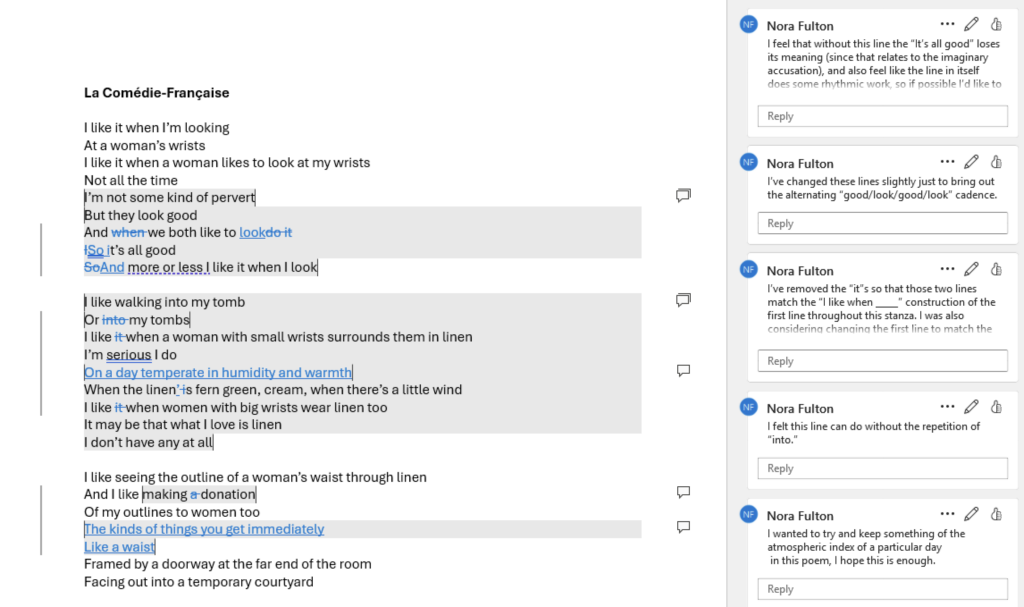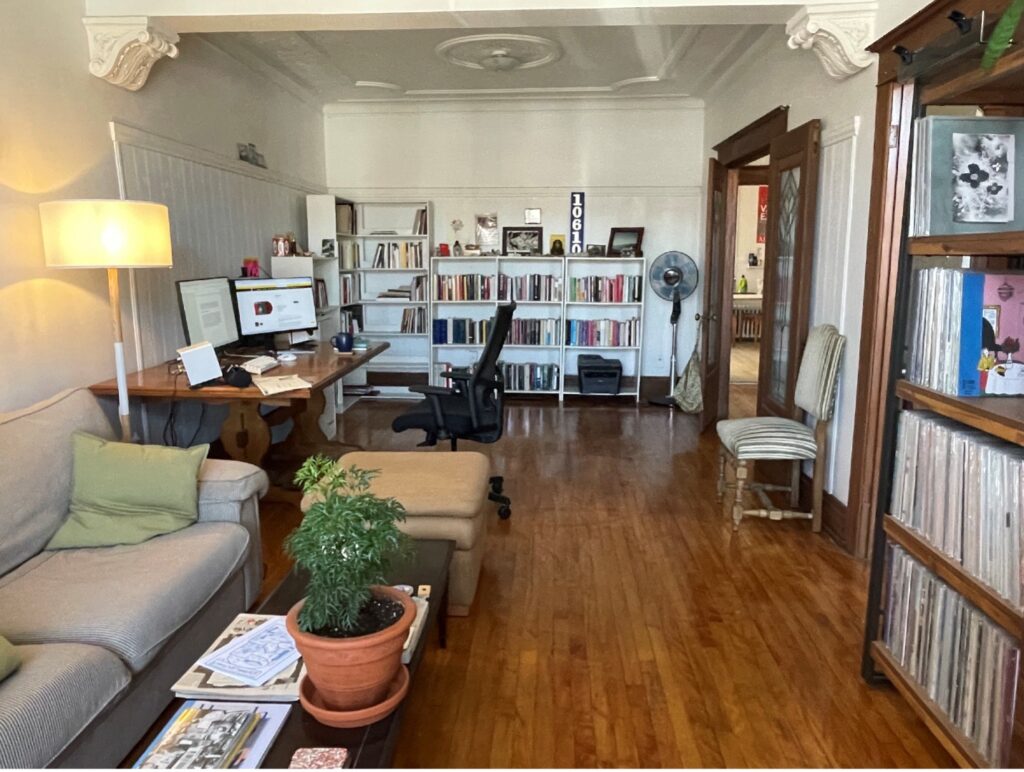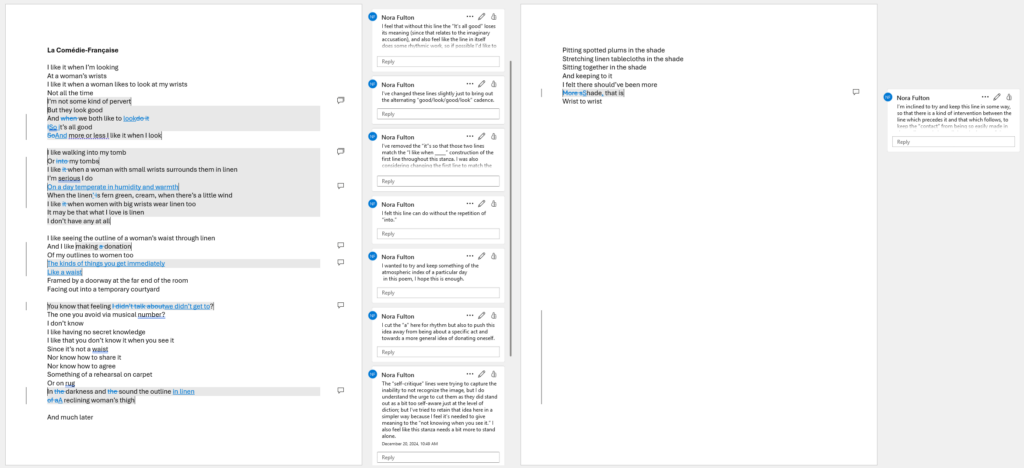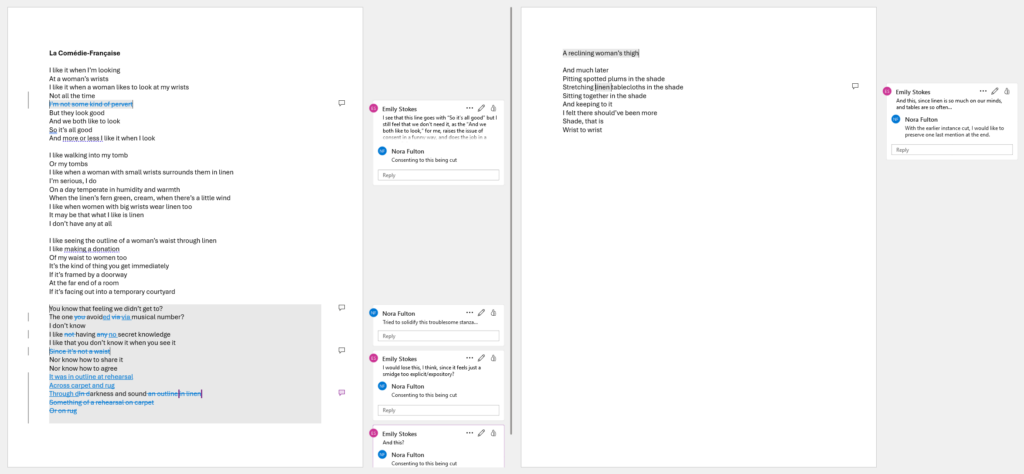Making of a Poem: Nora Fulton on “La Comédie-Française”

For our collection Making of a Poem, we’re asking poets to dissect the poems they’ve revealed in our pages. Nora Fulton’s poem “La Comédie-Française” seems within the new Spring concern of the Overview, no. 251.
How did this poem begin? Was it with a picture, an concept, a phrase, or one thing else?
I wrote this poem in September 2024, nevertheless it was a mirrored image of a three-day seminar I’d attended the month earlier than. The seminar, organized by two sensible mates, Matt Hare and Sam Warren Miell, was concerning the French movie manufacturing firm Diagonale, and centered on the work of its central director, Paul Vecchiali. Of the movies we watched, Encore and Corps à cœur had been particularly on my thoughts whereas writing. Each are romantic melodramas, however they undercut that tendency in plenty of attention-grabbing methods—I believe I discover them transferring exactly as a result of they undercut that a part of themselves. The seminar centered on the way in which that Diagonale functioned as a collective of people that would take up completely different roles in every movie, each in entrance of and behind the digicam. This was likened to the troupe established by Molière, to which the title of this poem refers.
Have been you pondering of every other poems or artworks when you wrote it?
On the time of writing I used to be pondering fairly carefully alongside the poetry of the Swiss Francophone creator Philippe Jaccottet. I had begun studying and translating his early poems in the course of the summer season, largely only for myself—I used to be engaged on them between classes of the seminar, and continued this work into the autumn. I used to be notably enamored with the way in which Jaccottet makes use of hesitation as a proper system in each his poetry and his journals (the unbelievable translations of which, by Tess Lewis, I used to be devouring throughout these revisions). It’s not simple to put in writing hesitation with out seeming both boastful or naïve. How can one hesitate within the subject of language, in any respect, anyway? However Jaccottet finds methods to put in writing by way of a reticence that manages to totally give up to realizing that it has no concept what it’s reticent within the face of, as in his journal entry for Might 1971. “I write precisely as I’ve stated one shouldn’t write. I’m not in a position to grasp the actual, the non-public—the precise particulars escape me, slip away; until it’s I who shies away from them.”
The place did you write this poem?
Within the entrance room of my condominium in Montréal. Proper now it appears to be like like this.

Do you’ve gotten pictures of various drafts of this poem?
The primary model of “La Comédie-Française” that I submitted to the Overview went by way of a really heavy preliminary edit, to the purpose that that draft now not appears related to the shape the poem finally took in print. The essence of that first edit was an extremely perceptive removing of assorted avoidant comedic detours, which pared the poem right down to central gestures I hadn’t seen alone—a pivoting away from and again into lyric transparency, and an try and make vernacular speech do one thing attention-grabbing aurally. I can provide two later drafts close to the tip of the enhancing course of, the place I really feel like I discovered some options to the numerous issues I’d created for myself.

On this draft (which I believe was the third), I’m revising a model despatched again to me from a earlier editor, so that you see solely my responses to their modifications. The “On a day temperate …” line had been lower initially, and I felt that one thing past the subjective—some register of exterior specificity—was wanted in such an inner piece, so I added that again in. There had additionally been many cuts made to the third stanza, and in consequence I assumed that a part of the poem lacked coherence, so I restored strains there as properly. I additionally lower articles and prepositions the place I might, a few of which had been later reinstated—perhaps I bought a bit zealous after how productive the paring down had been. The penultimate line of “Shade, that’s” had initially learn “Extra shade that’s”—it had been lower within the first edit, however was reinserted right here. Whereas the repetition of “extra” initially got here from the spirit of self-correction the poem begins with, I now not felt that it wanted to finish in that register, and wished to mood the pull of the concept that it’s the shadows that develop shut, moderately than the rest.

A few drafts later, it’s the fourth stanza that has turn out to be the difficulty. By that stanza, I wished the gaze of the “I” to have traveled from tranquility and lightweight to darkness and noise, and that motion was not simple to render with out overwriting. The stanza’s first line shifts from a sense of “I didn’t get to” to a sense of “we didn’t get to”—earlier than that, it was a sense a “you” prevented, and on this draft the pronominal attribution is eliminated altogether—the sensation is alleged to be impersonally “prevented by way of musical quantity.” Within the revealed model, it’s once more a “we” that’s doing the avoiding. Absolutely there’s a kernel of inane psychologism in these choices on my half, however I additionally assume there was an actual query of the place to go from the hyperfocus on the “I” that the poem begins with. It has to go some place else. Within the third stanza the “you” features as a common “you,” unmediatedly perceiving a top level view and instantly realizing what it’s a top level view of is alleged to be one thing “one does” on the whole. Then within the fourth stanza, the “you” shifts to one thing extra particular, however remains to be attempting to proceed speaking about that common. The “I / you” dynamic is difficult to seek out an exit from, and possibly I didn’t fairly accomplish that right here. However neither did I really feel that merely leaving out pronominal attribution can be an answer— that may really feel low cost to me. So I went with a “we” that might be each a container for the “I / you” and for the generality that’s implicit in the concept one thing like linen might be one thing like an index of one thing like girls.
Additionally, that “I’m not some form of pervert” line bought lower. Ah, properly.
When do you know this poem was completed? Have been you proper about that? Is it completed, in spite of everything?
I revise quite a bit. Method an excessive amount of. If I might, I believe I might return to each e-book and poem and essay I’ve ever revealed and contact all of them up, in order that they accord with the place I’m at within the current. Generally that touching-up is simply alternating between two or three or 4 modifications, and one in all them sometimes strikes you as a novel answer since you’ve forgotten you’d already tried it, simply as you had with all of the others. However is the completed model then the poem, plus the oscillation round every such level of indecision? I don’t assume so. That’s why Jaccottet’s hesitation pursuits me—revision is mainly simply hesitation. However the purpose is to make one thing that’s revised/revisable and true. I believe that poems are completed when the poet’s consideration lastly wanders away from them and onto another revisable factor. Which suggests, they’re completed if you don’t hesitate in your wanting again on them.
Do you remorse any of those revisions?
I do want I might have discovered a strategy to hold some factor of the “I’m not some form of pervert” line. The concept of coming out of this melodramatic lyrical mode to offer a proviso like that also makes me snigger, and normally one thing that makes me snigger in a poem is one thing I wish to protect. After I was writing “La Comédie-Française” I had in thoughts the boundaries which might be positioned on the attainable articulations of the wishes of ladies like me—limits that we placed on ourselves, too. I ended up reducing that line based mostly on editorial suggestions, and I consoled myself in pondering that the poem as an entire might be my response to that concept. However, from a sure viewpoint, penning this piece might be my means of placing it again in.
Nora Fulton is the creator of three books of poetry. Cuckoo’s Low Reel is forthcoming from Hiding Press this spring.

0 Comment